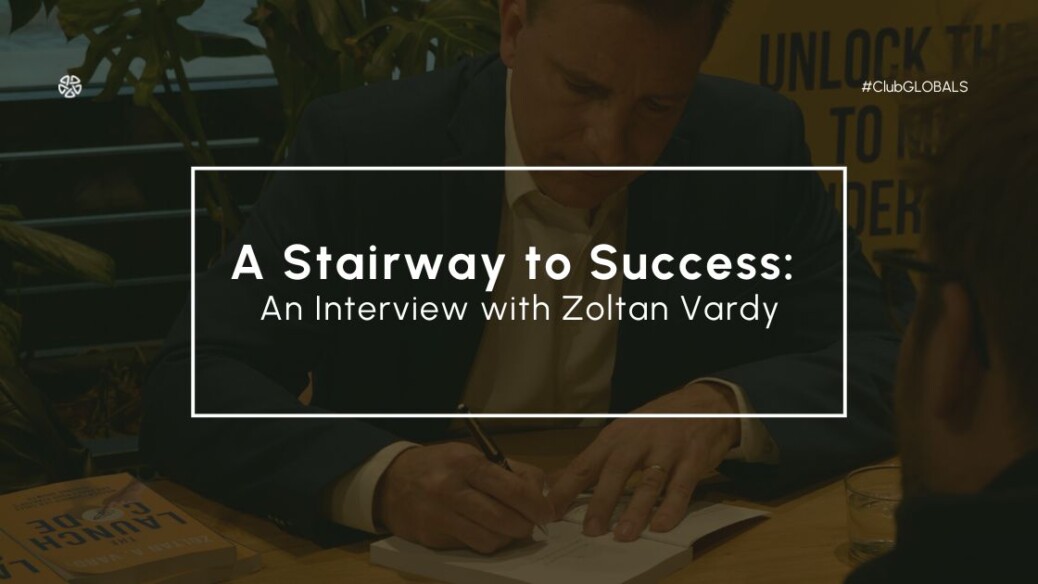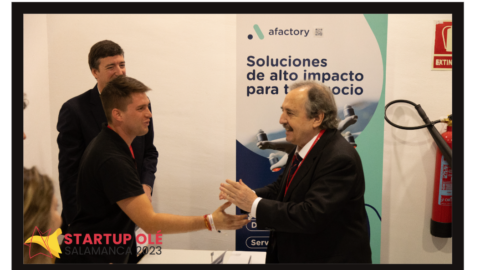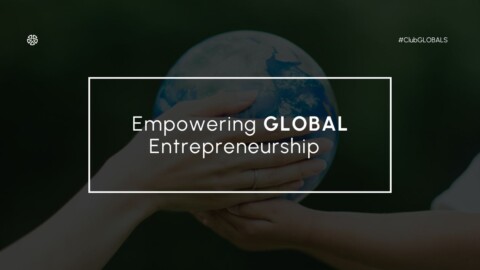A Stairway to Success: An Interview with Zoltan Vardy on The Launch Code

There’s no doubt about Zoltan Vardy’s success in the business world, and you don’t have to dig deep to see why. He carries himself with natural confidence yet remains approachable, striking a balance between professionalism and warmth.
When I admitted that I was a little nervous about the interview—because I’m no expert on the subject—he put me at ease instantly, saying:
“…don’t worry about it. I’ll try to be as clear and as simple in my communication as possible.”
The Interview
Welcome, Zoltan. It’s a pleasure to have you with us today.
Q: There are many books about this subject. What gap or industry glitch did you find that made you feel like this is necessary? How does it distinguish itself from the others?
R:
Well, you know, I think what makes it unique is: a lot of the sales books out there follow a very practical, tool-driven approach. Do this, then do this, then do this—right? So it’s often very much a guide to executing the idea, the skills, the techniques.
What I realized is that many of the companies I worked with—the founders weren’t even mentally prepared to apply these tools and techniques because some fundamental things were missing.
So, when I wrote the book, what I realized through my conversations and my work with founders is that there’s a mindset you have to adopt first. And it’s only after you accept that mindset that you can then be successful in applying the principles.
So the book is really about not just strategies and tactics, but mindset as well.
Q: So what’s that mindset?
R:
The mindset, for me, starts with understanding that sales matters. There’s an expression I use: Nothing happens until somebody sells something. So what that means is just understanding that—even if you fear sales, even if you’re not comfortable with it, even if you feel like, “well, my product’s so great, people should discover it”—until you accept the fact that sales matters, you’re never going to be successful as a founder.
So that’s the first principle.
The second principle is: once you understand that, then you have to realize that sales is not about convincing someone to buy something they don’t need. You know the overused image of the car salesman trying to fool someone into buying a bad car? Sometimes people have that impression of salespeople. But I believe sales is not about that.
It’s about helping someone solve an important problem. I talk about the connection between the problem and the solution. That’s the foundation of successful selling: identifying what problem you solve, who you solve it for, and why you solve it better than anyone else.
Once you accept that, sales doesn’t feel like an imposition. It becomes: “Look, I’m offering you a solution to something you have a problem with.”
Once you internalize those two principles, it really becomes a question of: How can I adopt this and use certain principles and tools to become successful at sales, build momentum, and then build the company you dream about?
Q: You highlight the importance of messaging in sales. What’s the most common mistake founders make when crafting their pitch?
R:
The single biggest mistake founders make is thinking they’re everything to everybody.
They create this ocean of opportunity and think that the wider they spread the net, the more successful they’ll be in catching clients. Actually, I’ve found the opposite is true.
The more narrow your focus, the more niche you are, the more likely you’ll become the perfect solution to one very specific problem—rather than one of many possible solutions to many different problems. And that’s how you scale.
Think about Amazon. Today, Amazon is everything to everybody. But when it began, it sold a single product: books, to 20-something men using the internet in the mid-1990s who were looking to access titles they couldn’t easily find in bookstores.
That was the problem-solution connection.
Only after nailing that connection were they able to scale and add music, movies, and all the rest. I call that the tip of your spear. Once you break through the wall, you can expand.
Many founders make the mistake of expanding too broadly and never breaking through that wall.
Q: At what point should a startup transition to hiring a dedicated sales team?
R:
There’s always that beginning stage—the pain of sales—when you’re iterating, testing, failing, rethinking. That process can take two, three years. This idea of overnight success? It mostly happens in movies.
Yes, some people get lucky—like picking the right lottery numbers. But for the overwhelming majority, the struggle at the beginning is real. And it’s necessary.
You have to understand your customer, create a product that solves a meaningful problem, and take feedback from the market to refine your offer.
When you’ve got a clear message, a clear target audience, and you’re seeing traction—that’s when it makes sense to consider hiring someone to take full-time responsibility for sales.
And here’s another reason: if founders handle sales in the early stages, they’ll understand what kind of salesperson they actually need to hire—because they’ve done it themselves.
Q: What’s one unconventional sales tactic from The Launch Code that has surprised founders the most?
R:
How can you explain—in 10 seconds or less—what problem you solve, who you solve it for, and why you’re better than anyone else at solving it?
I’ve developed a five-step process in the book that helps founders build a sentence that answers exactly that. And what’s amazing is—when founders go through it, they often have a physical reaction. Shoulders relax. They smile. It’s that “Oh, I finally get it” moment.
It’s simple, but incredibly impactful—and something that founders really benefit from.
Q: In founder-led sales, confidence is key. How do you recommend technical founders overcome discomfort in selling?
A:
In my experience, you build confidence through success. The more success you have, the more self-assured you become.
I worked with a founder in Poland—very typical tech guy. Product-focused. Quiet. Not confident in sales at all.
As he started applying The Launch Code principles, he gained traction—and confidence. Soon he was presenting, doing LinkedIn videos, closing deals. After two years, he’d grown revenues by 400%, went from six clients to 52, and expanded from one country to 12.
It was like talking to a different person.
That transformation is what I’m proud of. When you adopt the right mindset and approach, you go from fearing sales to actually loving it.
It’s all about breaking through your own barriers. Persistence is a powerful motivator—a basic ingredient to success.
Q: What’s the biggest mindset shift a founder needs to adopt to implement The Launch Code successfully?
Maybe one thing I would emphasize is: people buy books or courses with motivation, but then they put them in a drawer and forget about them.
I would encourage founders—if you buy this book—take the time to go through the process. There’s no magic. There’s no hidden “sell” button that suddenly works.
We live in a world full of Instagram and LinkedIn “experts” saying: “Do this and be a millionaire overnight.” Posing with Lamborghinis and model girlfriends.
I don’t believe in that. That’s hustling, not building a business.
I wrote this book for entrepreneurs, not hustlers. For people solving meaningful problems in meaningful ways—something they believe in. And that belief is what gets you through the hard times.
If you’re just doing it for the money or the flashy lifestyle—it won’t last.
Q: So it’s about authenticity?
A:
Authenticity. Absolutely. Authenticity.
Q: The book is pretty approachable. It’s not just for salespeople—it’s for entrepreneurs, right?
A:
Everything is sales. You’re selling yourself in a job interview. You’re selling when you’re trying to convince someone of your opinion.
I think people shy away from sales because they have a negative view of it. But everything is selling. And while this book targets startup founders and early-stage companies, the principles can honestly apply to your life—not just your business.
Thank you, Zoltan, for sharing your expertise and experiences with us.
———————-
Zoltan Vardy doesn’t promise shortcuts—he delivers a system. The Launch Code is for founders who are done guessing and ready to grow with clarity, confidence, and grit. If you’re serious about building something real, this is a good place to start. For more information on The Launch Code and Zoltan’s work, visit his website at zoltanvardy.com.

About the author
Mahitë Pérez Scafiezzo is a Uruguayan art director and entrepreneur based in Barcelona. Specializing in visual storytelling and concept development, her work is centered on emotion, identity, and atmosphere. With a refined, intuitive approach, she brings depth and insight to every project she contributes to.









